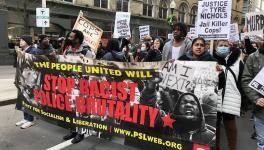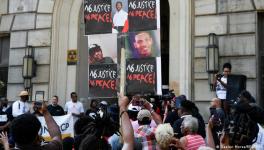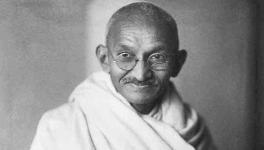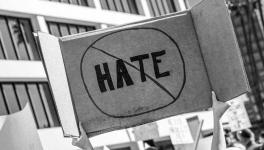From Rebellion to Revolution
100,000 person mobilization in Philidelphia.
A profound rebellion against racism has been sweeping the country for a month. Millions have taken to the streets in every part of the country, shaking public opinion. Elite institutions, individuals and corporate brands are scrambling to offer symbolic sacrifices at the altar of racial justice in the hopes they will be spared from the righteous wrath in the streets.
At the same time the police are wantonly attacking protestors and continuing to murder Black people, making a mockery of all the “official” declarations of “anti-racism.”
Hidden in just this fact is the most important lesson: The capitalist system grants concessions only in defense of its own stability. None of the grisly facts of racism were unknown or undocumented prior to the assassination of George Floyd. The only thing that has changed is people are willing to burn down buildings and confront the “shoot-to-maim” riot brigades.
Stability has not been restored. Massive crowds continue to come out into the streets; unions are taking strike action for Black Liberation; and a big cultural moment featured a Black Communist as the hero.
Various attempts to extinguish the flames of resistance–through force or flattery–have had the opposite effect. For the authorities this begs the question of what will get people out of the streets? Those in the streets meanwhile grapple with what it takes to make substantive changes and what would even constitute “real change.”
There are many rebellions, fewer revolutions. Rebellions are usually associated with fighting the good fight, revolutions with winning it. We remember many slave rebellions across the Americas, but only one slave revolution. We celebrate the heroism of Nat Turner and Dessalines equally but recognize that their achievements are of different orders.
Rebellions express the inability of the current system to resolve its own contradictions using the existing political framework. Revolutions resolve those contradictions: a new framework, a new system.
The uprising that erupted after the murder of George Floyd is beset on two sides. On the one hand the forces of “law and order;” on the other an assorted group of “reformers” seeking to placate resistance through cosmetic change. In other words, on both counts, the familiar strategies of counter-insurgency designed to quench any rebellion to the status quo: repression and co-optation.
And they are right to be concerned as this new upsurge in the Black Liberation Movement coincides not only with a pandemic but also a severe economic crisis and the unfolding disasters associated with climate change. The idea of socialism — the extension of social and economic rights — is rising and unsettling the capitalist status quo. The LGBTQ movement and the rise of #MeToo are taking aim at thousands of years of social and cultural conventions.
The oppression of Black America is so central to the country that the struggle for Black Liberation has often acted as a detonator, so to speak, setting off broader social struggles throughout the system. In today’s volatile mix, the charges now rigged to blow may be too difficult for capitalism to withstand.
Those in the streets are learning concretely about their own power. The scale of the response to the uprising — from nearly every corner of the capitalist class — has also revealed that they fear that the struggle of the Black community will grow and expose a distinct source of weakness.
Moving from rebellion to revolution is ultimately figuring out how to operate the “detonator factor” capitalist elites fear so much.
This is the political context with which we now approach the question of “reforming” or “defunding” or “abolishing” the police.
What is policing?
The first really “modern” police department in the United States were the Charleston City Guards formed in the 1730s. They were created out of fear that the more informal methods employed before were not sufficient to prevent slave revolts.
Policing has further roots in the growth of urban centers in the mid-19th century. The expanding capitalist economy was growing through large influxes of immigrants rendering former methods of social control less effective. Notably, the rise of policing in this context was not a response to rising crime; in fact, in some early police bastions, crime appeared to even fall in the decade preceding the formation of police departments. They were about control.
The issue was not the scale or intensity of the “crimes” but who was committing them. Those with the power to mould public opinion identified the new working classes as a particular threat. They saw and portrayed the workers as a mob, prone to licentiousness, who must be controlled for the good (read: stability) of society.
The Boston Council noted, for instance, the need for police based on the “great numbers” arriving in the city without the benefit of “New England training” who can be “held to restraint” only by “fear of the lawgiver.”
In both cases the police were not a reflex response to “crime.” Then–and now–they were the instrument for controlling classes of people deemed “criminal,” prior to any individual action. The essence of deploying the police as a “preventive” force is clearly predicated on determining that “crime” is “natural” to some more than others.
Any system of laws, to be effective, has to establish some universal legitimacy. Having the police known as purely protectors of property and order for the rich would not do. So they grew to include other auxiliary functions and were recast in popular culture and by the political elite as unbiased and heroic “public servants.” Policing became the generally accepted means by which two crucial needs are secured for the populace at large: personal safety and contract enforcement. This perceived legitimacy of the notion of policing gives the police as an institution tremendous cultural authority.
The real story
In reality, crime is at historic lows and what crime is out there isn’t being dealt with terribly effectively by the police. Less than half of (FBI described) “violent” crimes (46 percent) are ever solved, and only 17 percent of “property crimes.”
Despite the perception that the police are out there “fighting a war” as they always put it, being a cop is actually less dangerous than being a farmworker, groundskeeper, septic tank servicer, garbage collector, truck driver, roofer, or flight engineers — just to name a few of the 15 jobs officially more dangerous than being a police officer.
There is no real war with crime. Yet in city after city, militarized police drain 30 to 40 percent of municipal budgets. There is certainly a signal that something else is at play. Take for instance “Stop-and-Frisk,” widely lauded for years as a very effective “crime-fighting mechanism” in every major city in the US. Many millions of people were stopped in New York, but only 0.3 percent resulted in a jail sentence longer than 30 days. Only 0.1 percent led to a conviction for a violent crime. Despite the racial disparities in the number of stops, whites who were stopped were 50 percent more likely to be found with a gun than Blacks.
The police were undoubtedly aware of these dismal results in real-time. So what other explanation can there be other than the issue wasn’t stopping crime but asserting dominance over areas pre-determined to be “criminal?”
From its beginnings until now policing is a system of social control. The police are not focused on “crime” generally but on certain communities and places, and the types of “crimes” that allow them to maximize their presence and overall social control. Wages stolen by employers adds up to more money than all other forms of theft combined. The police do not even investigate wage theft, which is restricted almost solely to civil law and financial penalties. People who steal literally millions of dollars they are legally obligated to pay are routinely treated much better by the legal system than someone who robs a liquor store of $500.
What to do with the police?
With the obvious racist bias and less than stellar public safety effect of policing, it’s no surprise that the movement in the streets is gaining almost universal support for “defunding the police.” Others in the movement are pushing reforms to give communities more tangible democratic control over policing and some call for the police to be abolished.
“Law and order” politics asserts that any reduction in the scope of policing is a recipe for chaos. The real issue, then, which immediately confronts those looking to restrict or get rid of the capitalist police is what will you do about “crime?” “Crime” is the one issue that allegedly has no cure. One person victimizing another is deemed to be a natural human trait, often buttressed by the “pathologies” allegedly stemming from a “culture of poverty.”
In reality, though crimes have roots, like any other social issue. Any program to limit the police must on the other side push for a social transformation to address these roots. It stands to reason that decreasing poverty would also decrease certain property crimes and robbery. Formal and informal “violence interrupters’ have demonstrated in miniature that empowered community members, armed only with moral authority, can make significant reductions in shootings and murders. After thousands of years of subordination of women to men, only a dedicated struggle and empowered society-wide movement against woman’s oppression can eliminate sexual assault. It only appears that “crime” cannot be eliminated because the current system of US capitalism cannot resolve the contradictions of this society — in fact it institutionalizes and perpetuates the conditions, the inequality, the exploitation and abuse that make safety and security precarious.
From this perspective “police abolition” takes a whole other dimension. The police are not an eternal regulator of human behavior, but a product of a certain stage of development of class society, built and expanded amid a particular time and certain conditions. Total social transformation, first to address the conditions that give rise to so many “crimes,” but also empowering the oppressed, will create new economic, social and cultural conditions where the police are not necessary. The end of class society, oppression and exploitation — such a society where just, equal and sustainable relations between people is the norm — is communism.
The issue of abolishing the police isn’t simply an issue of will, or lack of imagination but objective realities. The police did not emerge out of a bad idea — but as a special body of armed men to protect a highly unequal and oppressive ruling class. If we recognize that these are the roots of the police, and that the “crimes” they allegedly respond to also have roots in the social order, then it follows that the only way to eliminate such specially armed instruments of social control is to get at these roots.
With that being said, even in the here and now, with all the existent social problems, oppressed communities are so over-policed and over-incarcerated and policing and incarceration so ineffective it’s clear both could be dramatically curtailed and replaced more effectively right away.
What is really at stake is not the debate over how much policing can or cannot be reformed in the short term. What is essential is the struggle for power, the struggle to define the horizons of where we are headed. Capitalist reformers or communist revolutionaries?
Killer cops and cell blocks
Currently the movement in the streets is facing a debate of strategic importance: whether or not it is consistent to be for the abolition of police and call for the jailing of killer cops. One school of abolitionists answers that question in the negative — arguing that to use the “system” to jail killer cops is to reinforce the ideological existence of the overall policing-incarceration system.
This position is often presented as more “revolutionary” on its surface but in practice it would, if adopted, set the “revolutionaries” against the mass sentiment of Black people who entered into this generalized rebellion out of a desire for justice. The killing of George Floyd and so many others continues the legacy of Jim Crow-style injustice and racist lynchings — most vicious crimes which were never punished. The mass desire to punish the white supremacists and racist cops who have killed Black people for centuries is not wrong!
Crafting slogans is not about which combination of words is the cleanest or free of contradiction from the standpoint of philosophy or “discourse.” This may be the standpoint of some, but throughout history, what drives forward mass revolutionary politics is the gap between what a government says and what it does, the gap between its laws and stated ideals versus its actual practice. These contradictions — not the most revolutionary slogans — are what draws masses of people into rebellion. The fight for the most basic demands can lead people, if these demands are not met, to the most revolutionary conclusions.
Historically it is only a relatively small group of people who are drawn into struggle based on agreement with a worked out formula for what a new society will look like. The art of revolutionary politics — especially in a rebellious moment like this one — is to first and foremost identify that which has brought the masses into motion, to tap into it, to affirm it, and to validate it with fighting slogans that keep the rebellion going. Secondly, it is to introduce concepts and slogans that allow the movement to widen its vision, to make it harder to co-opt by the ruling class, and that further illuminate the path of struggle ahead. But this cannot come at the expense of the first task! To do so would be to reduce the movement to the “true believers” and isolate it from the mass sentiment that is ultimately the driver of history.
In the formal sense it can’t be denied that to make a demand on a system or an established legal process is to legitimate it to some degree. Why that is such an issue, is not clear.
Historically it’s a fact of struggle. The 20,000 slaves who fought on the British side in the “Revolutionary War,” and put on the monarchy’s uniform, explicitly legitimated the British crown but was their struggle against slavery unjust? Likewise for the honorable warriors of Florida’s Negro Fort who terrorized Southern slave holders under the ultimate “authority” of King Ferdinand of Spain. The enslaved and free Black people of Haiti who rose against the planter class did so invoking the documents and principles of France’s bourgeois revolution. In Reconstruction, Black communities across the South utilized whatever laws and federal forces that they could to defend their gains and hold in check the racists intent of beating, intimidating, defrauding and killing them.
Voting is the ultimate legitimation of the system. Should Black people not have fought for the right to vote? Should people not defend voting rights on the basis that voting feeds the bourgeois electoral logic?
When workers fight and strike for a better contract with their employer, they are accepting the underlying exploitative logic of capitalism — that the employer pays less to the workers than what they earn from the sale of their products. When tenants invoke their rights against an abusive landlord, they are ultimately invoking the laws of the capitalist state to show that they are right; and using one or another instrument of that state, the courts and the force of law. But they are not wrong either.
Furthermore, Cuba certainly applies a “carceral logic” towards counter-revolutionaries, but where would Assata Shakur be, or all the gains of the revolution for the working class, without Cuba’s determined struggle against US imperialism and to prevent counter-revolution? If we can accept the working class’s right to self-defense, and can accept the use of violence under certain conditions to prevent oppression and injustice, how could we object to a workers’ state’s use of prisons? The “carceral” logic of prisons is just an institutionalized form of that same violence. In our current context it’s easy enough to recognize the need to abolish the death penalty, but do we put deathrow on the same plane as the Haitian slave soldiers who hung French officers? Each situation has its own context.
The apparent contradictions at the level of discourse are in fact only surface deep. There is no contradiction between, on the one hand, demanding cops face the same judgment for murder as the rest of society, and on the other hand desiring that the capitalist state be smashed and replaced with a workers’ state, and for that matter working towards a society free of class division and the absence of a state altogether.
Take for example the 78 percent of Black people who responded to one poll that they wanted “tougher” charges against Derek Chauvin (murderer of George Floyd). But why would they be considered to have any particular view on the ultimate legitimacy of the police? Many of those, while embracing a carceral logic for Chauvin and other killer cops, would also declare themselves for the total elimination of the current police institutions.
The very idea of a revolutionary process implies that things have to go through stages. One set of demands and one struggle leads to the next.
Moving forward
What is the particular context that gives the struggle against police terror such ability to capture the attention and drive the political agenda of the country? Without a doubt because police terror is the raw edge of the oppression of Black people in the United States. It always has been. It’s an encapsulation of the humiliation and brutality that marks the wide spectrum of indignities perpetuated by racist America. More than any other thing, unchecked racist police brutality has been the number one driver of urban rebellion within the Black communities for over 60 years. If the police were immediately arrested and punished accordingly after each case, there would be no rebellion. It is the Jim Crow legal system, the double standard, that sparks such outrage and militancy. This has to be recognized.
The oppression of Black people as a people, a nation, was the central pillar of early capitalist wealth and Black labor became essentialized as reserved to the lowest wages, classifications marked more frequently by unemployment than other strata of workers.
The oppression of Black people is so central to capital that any rebellion from the Black community questions, even in some of its most basic forms, major shifts in the way society will need to be organized in order to address racism. If just the struggle for Black Liberation can shake the system, this shows that the actual achievement Black Liberation can only mean the total transformation of the capitalist system.
This is clear enough in the streets where specific critiques about policing are voiced interchangeably with general reflections of the brutal impact of racism on Black people. Police terror is just one major aspect of what is clearly a war on Black America.
Deepening the rebellion, and pointing towards revolution means embracing its strategic position. The struggle against police brutality can be elevated to one for liberation. Stopping the war on Black America means stopping the capitalist dynamics undergirding the oppression of Black people. Capitalist dynamics lay at the heart of so many unresolved contradictions that the need for a broad front against the capitalist system becomes clear, at least to movements that want to move from righteous rebellion to victorious revolution.
Eugene Puryear is a journalist at the US movement-centered Breakthrough News and a member of the Party for Socialism and Liberation.
Get the latest reports & analysis with people's perspective on Protests, movements & deep analytical videos, discussions of the current affairs in your Telegram app. Subscribe to NewsClick's Telegram channel & get Real-Time updates on stories, as they get published on our website.
























